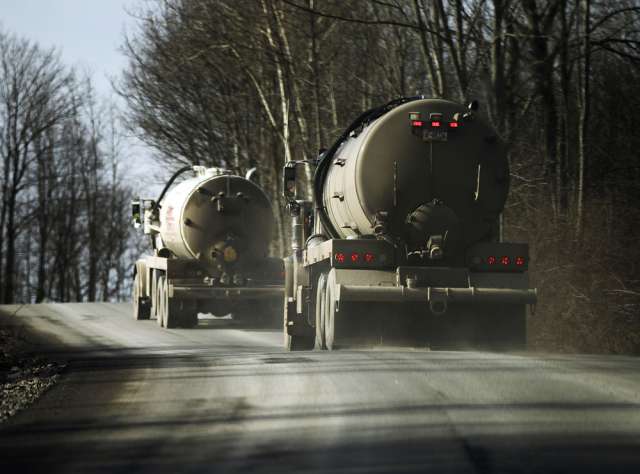
CALGARY — Canadian oil companies are scrambling to find places to store or ship their “distressed barrels” amid record-setting US$50-per barrel discounts, which is hitting a large proportion of their production.
Calgary-based heavy oil producers have been trying to hedge, find more railway cars or storage space as Enbridge Inc.’s mainline export system gets clogged up with companies bidding for more space than can be accommodated in the system, leaving companies with punishing differentials last week of US$50 per barrel between heavy oil benchmark Western Canada Select against Western Texas Intermediate.
Enbridge’s mainline was moving 1.8 million barrels per day of heavy Canadian crude in the summer, but that doesn’t necessarily mean they are all subject to the record-setting discounts. Some of those volumes are moving on firm, committed contracts, getting prices closer to the U.S. benchmark.
“The barrels that move on Enbridge’s mainline are really the spot barrels. It’s the barrel that’s getting the US$40 to US$50 differential,” Tudor Pickering Holt and Co. analyst Matt Murphy said.
Scotiabank commodity economist Rory Johnston says, “there are layered discounts throughout entire chain,” but said he wasn’t sure how much of the oilpatch barrels are subject to the massive discounts.
The price dislocations are leading to a growing volume of oil moving by rail, which Johnston said will rise from its current level of 200,000 bpd to 300,000 bpd by the end of the year.
The current highly volatile swings in WCS pricing is setting the stage for another difficult month in November. WCS was trading at a US$46.75 per barrel discount on Monday.
“At the end of next week, when Enbridge says, ‘Here’s everybody’s cut of the spot market,’ and everything that’s overhanging goes into distress,” said Kevin Birn, vice-president, North American crude oil markets at IHS Markit.
“Every month, as that distressed volume builds, the value of those distressed barrels falls, and the buyers of those barrels know it, and so every month they can exercise more power on it,” Birn said, adding that at current differentials oil-by-truck could be an economic choice for some companies.
The situation has led to discussions between Calgary-based oil producers, U.S. refineries and Enbridge on changing the way the pipeline company operates its main pipeline system in 2020, potentially switching from a nomination process to a system that runs on long-term contracts.
Many of those customers were angry with Enbridge when it attempted to change its nomination process earlier this year to boost oil shipments in a short-lived policy change that sent WCS markets gyrating for multiple days at the beginning of May.
Enbridge spokesperson Tracie Kenyon said the company wouldn’t comment on private business discussions with its customers.
In the meantime, Calgary-based oil producers are snapping up more railway capacity or trying to hedge at higher prices.
“We’re mitigating our exposure to wider, light-heavy differentials by taking a portfolio approach to transporting our product to market,” Cenovus Energy Inc. spokesperson Sonja Franklin said in an email.

In late September, Cenovus signed deals with Canada’s two major railways to ship 100,000 bpd to the U.S. Gulf Coast. Cenovus is also a part owner in two refineries in the U.S., which has reduced its differential exposure on approximately 50 to 55 per cent of its production, Franklin said.
Roughly 80 per cent of Suncor Energy Inc.’s bitumen production is fully insulated from the differentials, spokesperson Erin Rees said in an email.
“And the other 20 per cent is only potentially exposed due to the work of our marketing team, our significant midstream capacity and a vast logistics network we can leverage and for operational purposes,” she said.
Husky Energy Inc. spokesperson Mel Duvall said his company owns more refining capacity than it can fill up with its own production, and is not negatively affected by WCS/WTI differentials.
The company has bought its competitors’ oil at a discount to run through its refineries.
But the WCS-WTI differential is only part of the story affecting Canadian oil producers, GMP FirstEnergy director of institutional research Martin King said.
“All the crude is on sale,” King said, noting that even Canadian light oil, which usually fetches higher prices, has been trading at US$30-per-barrel discounts as “they have to share the same pipes.”
If you add it all up, GMP FirstEnergy analyst Michael Dunn said, the 3.5 million barrels of per day of total Western Canadian oil production is trading at an at least US$30 per barrel discount, which means producers are losing out on around $100 million in revenues every day.
Smaller heavy oil producers without refining assets have been working to hedge their production to ensure they don’t face crippling discounts.
Pengrowth Energy Corp. produces 23,000 barrels of diluted bitumen per day, but has fixed hedges in place that lock in the discount for 17,000 of its barrels at US$16.82 each, spokesperson Tom McMillan said.
He added Pengrowth is trying to add more hedges and has futures contracts.
At the moment, only 400 barrels per day of the company’s production is facing large differentials, McMillan said.
Tudor, Pickering and Holt’s Murphy expects Canadian companies will continue to grapple with big discounts until the second quarter of 2019, when oilsands plants begin their maintenance season. “At that point in time, you take stress off the system,” he said.
• Email:
You can read more of the news on source
